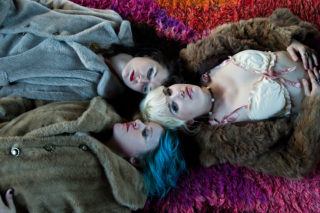Bleached’s new EP will come with a zine that features a who’s who of creative female voices
Listen to the LA band's new track 'Can You Deal?' too

Listen to the LA band's new track 'Can You Deal?' too
What’s it like being a woman in rock music? It’s been the subject of many a think-piece and music industry conference panel. Fair point, but last time out Jennifer Clavin from LA band Bleached got fed up with the reductive line of questioning. The album she was promoting, ‘Welcome the Worms’, was a record about a previous abusive relationship and her reliance on drugs and alcohol as a result.
Now, Bleached have a new EP on the way. Calvin’s put together a longer statement to put it all in context but has also announced that the release will be accompanied with a zine featuring a number of brilliant guest contributors, as follows…
Mecca Vazie Andrews (Sex Stains)
Julien Baker
Alicia Bognanno of Bully
Sadie Dupuis (Speedy Ortiz)
EMA
Alice Glass
Laura Jane Grace
Micayla Grace (Bleached)
Allie Hanlon (Peach Kelli Pop)
Hinds
Ali Koehler (Upset, Vivian Girls)
Sara Landeau (the Julie Ruin)
Staz Lindes (The Paranoyds)
Lizzo
Dani Miller (Surfbort)
Kate Nash
Liz Phair
Jane Weidlin (The Go Go’s)
Allison Wolfe (Sex Stains, Bratmobile)
Tegan Quinn (Tegan and Sara)
Patty Schemel (Upset, Hole)
Kim Schifino (Matt and Kim)
Mish Way (White Lung)
Hayley Williams (Paramore)
Listen to the first track from the EP, ‘Can You Deal?’ below. Here’s Jennifer Clavin’s full comment on the matter.
“I create music and art because I need to. To express, to bond, to reconcile, and to connect. And to use my voice. To have it received with such a generic labeling as “girl band” and consistently referenced as “female fronted” is insulting and reductive. The title track to this EP, “Can You Deal?” is about this experience. Last year we released a deeply personal full length album titled Welcome The Worms. It was a record about being in an emotionally abusive relationship. It was a record about getting spun out on drugs and alcohol. It was a record about totally losing myself in order to find myself. It was also our most ambitious body of work yet, with guitar work and guitar sounds and production we had only dreamed of until then. And yet to this day I am still fielding interview questions that have more to do with my gender than with the art I am creating. Somehow the conversation usually derails into some variation of the following question: “What is it like to be a girl in a rock band?”. And the ensuing story will define us based on our sex. Why is gender pointed out in nearly all coverage of our band? Labeling me as a woman in a band just puts me in a box, and doesn’t allow everything else I am to be seen and heard. It’s 2017, Can You Deal with women playing rock and roll yet?”